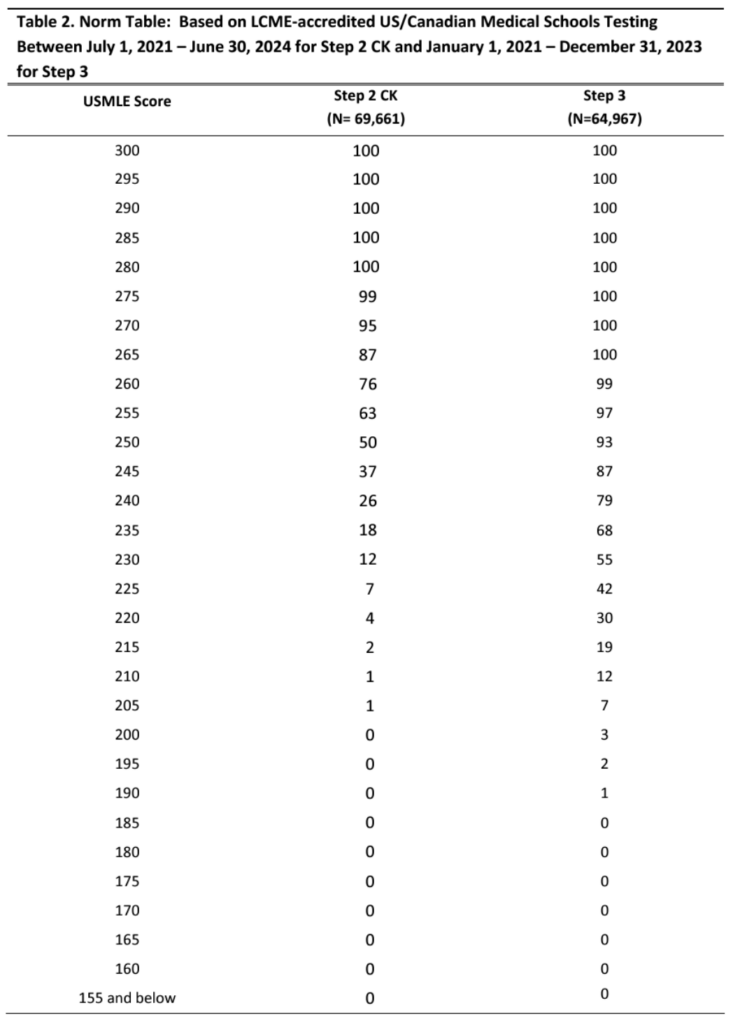
Aim High, Score Higher: Planning for a Standardized Exam
To mentally prepare yourself for success on a standardized exam, you’ll first want to have an end-goal in mind. Answering for yourself, “Am I ready to take the real thing?” largely comes down to knowing whether your practice scores are competitive, and feeling like you’ll do about as well as you ever will.
You can best accomplish this by setting an appropriate Goal Score for Test Day. However, this is not as simple as picking a high number and hoping for the best. This number should be customized to you. I assist my students with this process by breaking it into these 5 Questions.
1) How do scores on the standardized exam you’re taking compare to the percentile of test-takers you’ll have out-performed by getting that score?
For example, this table from the USMLE Step Examination Score Interpretation Guidelines:

2) What do the average test scores achieved by the people at the places you want to go?
As a reference, Table B1: Test Scores and Experiences of First-Year Residents, by Specialty. (Click the text to follow the link… that table is way too big to add directly into this article.)
3) How well have you performed on past standardized exams and relevant courses/blocks?
I’m sorry to break this to you if you’re someone who self-identifies as “not a great test taker” but the correlations here are strong. Don’t shoot the messenger, though; this comes from Predictors of Performance on the United States Medical Licensing Examination Step 2 Clinical Knowledge: A Systematic Literature Review.
Overcoming a history of less than ideal percentiles is possible, but it requires you to outpace the growth trajectories of those individuals who have a history of scoring higher than you.
4) Speaking of, how does your exam preparation schedule compare to the average test takers?
According to most studies, the average time spent preparing for the USMLE Step 1 exam is around 3-6 months, with students typically dedicating 300-400 hours of study time, including reading textbooks, reviewing prep materials, and taking practice questions; while Step 2 CK usually requires around 250-350 hours of study over 4 or more months, and Step 3 generally takes 100-150 hours over 2-3 months of review.
5) After answering questions 1-4, consider, is your Goal Score a S.M.A.R.T. goal? (Specific, Measurable, Achievable, Relevant, Time-Bound)
Here’s an example I quickly threw together using Chat-GPT…
Goal Statement: Improve my performance on Step 2 CK practice exams, focusing on internal medicine topics, to achieve a score of 250+ by the exam date in four months.
- Specific: Target a specific aspect (e.g., internal medicine) known to need improvement based on previous NBME results or self-assessments.
- Measurable: Define success with clear metrics.
- Achievable: Make sure the goal is realistic given resources and time.
- Relevant: Ensure it aligns with overall objectives.
- Time-Bound: Set a deadline for assessment and adjustment.
Keep in mind, this goal can also be adjusted or expanded as you achieve milestones, ensuring adaptability while maintaining your focus.
